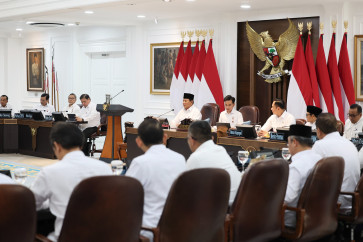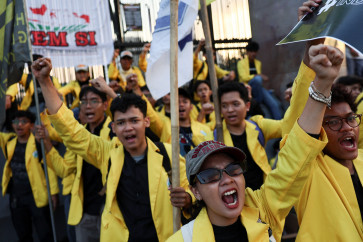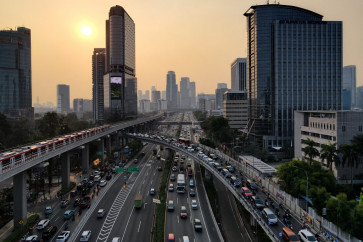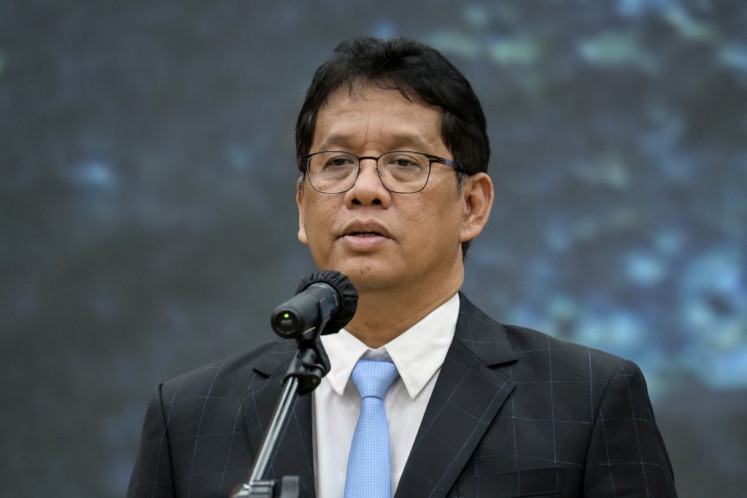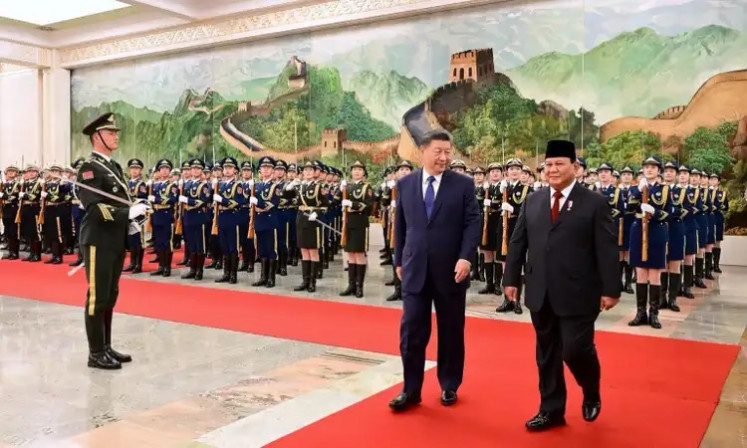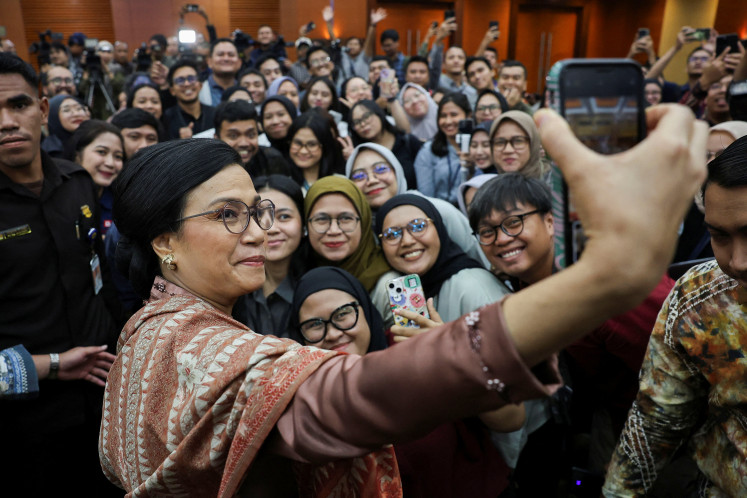Popular Reads
Top Results
Can't find what you're looking for?
View all search resultsPopular Reads
Top Results
Can't find what you're looking for?
View all search resultsIndonesian patriotism: Recalling the middle path
From the heyday of the nationalist movement in the early 20th century to the reformation era, Indonesian patriotism has been built on the spirit of compromise by seeking the middle way among various stances
Change text size
Gift Premium Articles
to Anyone
F
rom the heyday of the nationalist movement in the early 20th century to the reformation era, Indonesian patriotism has been built on the spirit of compromise by seeking the middle way among various stances. Our leaders were adept at keeping the balances between differences.
These leaders gave priority to wisdom and sound judgment. In many debates among them, nobody absolutely won. Nor was anybody totally defeated.
This is Indonesia, belonging to no particular group or person. All parties have contributed to building this nation.
All citizens have the same right to live and to believe. All people can freely choose parties or leaders as they like. So can they be chosen. This is a free country. Hard work, however, is needed to establish this principle.
The unclear relationship between state and religion in Indonesia often causes confusion. Many wonder whether Indonesia is a secular or religious state. On many occasions, intellectuals and pundits have rejected both categories.
Whereas Sukarno and M. Natsir still differentiated the secular and religious state, later thinkers sought a compromise between the two terms.
The attempts can be seen in the works of Driyarkara, a prominent Indonesian philosopher, who underlines that Indonesia is neither a secular state (in which state and religious affairs are completely separated) nor a religious state (in which a certain religion dominates the law of the state).
Driyarkara explains that some ethics and norms in the Indonesian society are based on religious values. Religion is a vital element in Indonesian life. Religion cannot thus be simply discarded. Indonesian society and religion cannot be divorced. The relationship between state and religion, however, yields a different formula.
There are, of course, some ambiguities in the aspects where religion should play a role in the state and in what aspects religion should be kept away.
This conundrum has generated heated debates from the early twentieth century to the present day.
In fact, Indonesians are religious, no matter what faith the people embrace. Additionally, religion and politics are often interwoven.
In the wake of 1965 upheaval, the New Order government imposed upon citizens the necessity
to embrace one of the official religions. On our ID cards our chosen religion is stated. Atheists have no right to live in this country. President Abdurrahman “Gus Dur” Wahid, challenged this. The attempt, however, failed.
On the other hand, intellectuals are quite alert to the danger of the use and abuse of religion in the state system and public life.
Munawir Sjadzali, a minister of religious affairs under the New Order government, clearly stressed that Indonesia is not an Islamic state.
There is no reason to reject the consensus reached by previous leaders in the light of modern democracy and human rights.
It is true that the majority of Indonesians are Muslims. But Islam is not the sole factor that can glue all people together. Throughout history Islam was not the only aspect which united different ethnic groups living in various islands.
The Islamic kingdom Mataram, located in present Yogyakarta, failed to repeat what Hindu’s Majapahit had achieved. So did other Islamic kingdoms, such as Pasai, Demak, Pajang, Bone, Tidore, Makassar and Kartasura. They never successfully controlled half of Majapahit’s territory. Some even battled against each other.
Ironically, the Dutch rulers often served as the mediator to find peace among them, as lampooned in the novels by Mangunwijaya. Truces and treaties were signed before the might of the colonial government.
That Islam is the only solution to the current problems facing Indonesia is deceptive and illusory. What is true is that Islam, and being Muslim, is part of the dilemma that Indonesian intellectuals have been trying to find a solution to for a long time.
Indonesians have so far no intention to abandon this religion. Compromise between religious values and local tradition has been made. It is not easy for Indonesian Muslims to place their religion in the national context, particularly when the religion complicates their identity — given the fact that not all Indonesians are Muslims and not all “old Islamic doctrines” are relevant to the current Indonesian character.
Amid the New Order’s ideological propaganda of “development”, Mukti Ali, a key advocate of religious dialogue in Indonesia, coined the slogan of “spiritual and material development”. In this regard, Ali saw that religion could play a role in the process of nation building. Religion should contribute its spiritual dimension to the advancement of Indonesian human resources. Spirituality and morality taught by religions are positive aspects that could perhaps add another ingredient of economic growth and scientific progress.
In this vein, Indonesia is different from Turkey, in which Mustafa Kemal Pasha Ataturk sought to implement Western principles of secularization. Nor is the case of Indonesia similar to those of Middle Eastern countries in which reformation is performed very late with regard to the current tide of democratization in the Arab Spring.
Indonesia, claimed by our pundits, is unique, different from other democratic countries in the East and the West. Our democracy is Pancasila’s version, whose interpretation is always ambiguous and changing from the Old Order to the reformation era.
It is therefore unsurprising that many Indonesians have a concept of a perfect man/woman in the person of Habibie, the third president, who is a scientist, bureaucrat, politician and yet religious. When asked about their dream, many Indonesian children in the 1980s and 1990s wanted to become a genius like they perceived Habibie to be. In reality, Habibie’s political career, like Gus Dur’s, was not free from controversies.
The middle path sought by our founding fathers and the later generation of intellectuals had to pass many bumpy roads. Some wanted to bend the system to the right direction, whereas others to the left.
Some saw that the middle path was boring and therefore wanted to turn the direction to the far left. They were thirsty for revolution. This endeavor ended in disaster. Communist revolution failed at least twice in the case of Madiun and in the 1965 upheaval. Along with the collapse of communist ideology in the world, and with the triumph of liberal democracy, we never hear of any signs of revivalism in this direction in Indonesia.
Others attempted to swing the pendulum to the far right. They believed that religion, particularly Islam, should take a greater part in state affairs and public life. Islamic radicalism was born. Conservatism seized the moment.
However, extremism in whatever forms and styles has failed in this country. In the name of Islam, Kartosuwiryo’s rebellion against Sukarno was extinguished. Learning from the past, Soeharto gave not the slightest chance for religious extremism.
During Susilo Bambang Yudhoyono’s administration, radicalism did not gain the public’s sympathy. Violence inflicted by radicals was cursed. Major religious groups stated their commitment that the Republic of Indonesia is the final consensus, which should be guarded until the last drop of blood. Any attempt to weaken the nation should be fought.
However, conservatism is disguised in various forms. The state showed a lenient attitude to radical groups, which often showed off power in the public. The principles of the middle path should be recalled.
Why were those who attacked and killed Ahmadiyah members sentenced to less than a year in jail? Why were the local ordinances with sharia content never revoked? Has the state ideology already swung to the right direction?
The writer is a lecturer at the Sunan Kalijaga State Islamic University, Yogyakarta


